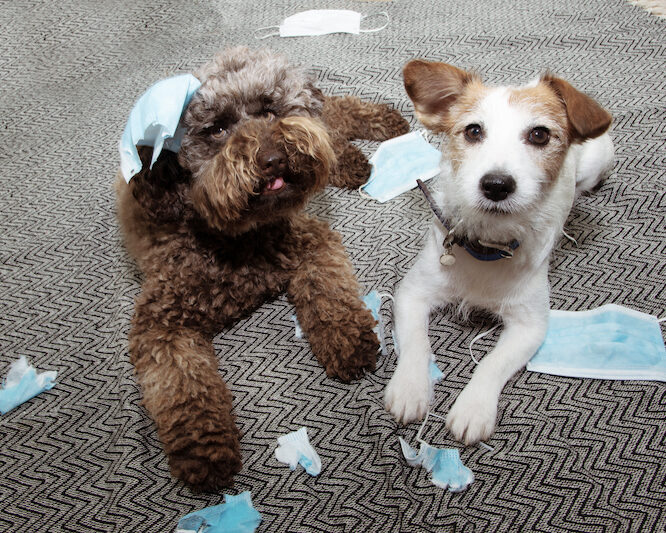Just like humans, dogs are emotional beings. Apart from being extremely loyal, dogs also possess the ability to connect with their pet parents easily. When they find themselves in distress, dogs can start experiencing problems like howling, barking, digging, and chewing, as well as frequent defecation and urination. Unfortunately, some people believe that these actions are nothing but poor house manners, which couldn’t be any further from the absolute truth.
Suppose you’ve ever noticed your dog performing any of the actions mentioned above. In that case, there’s a good chance that they are suffering from separation anxiety – an issue that dogs tend to suffer when they sense a period of separation from their owners. This has become an even bigger problem due to the ongoing pandemic since dogs have gotten used to their owners being at home the whole time. Because the world is expected to start opening up again soon, we should start preparing our dogs for it right now.
How to Identify if Your Dog Has Separation Anxiety
When treating a dog suffering from separation anxiety, it’s essential to teach the dog how to enjoy – or at least tolerate – the feeling of being alone at home. That being said, some of the most common symptoms of separation anxiety include:
- Defecating and urinating: Some dogs defecate and urinate after being left alone at home by their pet parents.
- Howling and barking: A dog might start howling or barking for a long duration once its pet parents leave the house.
- Digging, chewing, and destruction: Some dogs might start digging on doors and doorways, chewing on window sills or door frames, or destroying household objects when they’re home alone.
- Escaping: A dog might try to flee from the premises after being left alone at home.
- Pacing: Some dogs will start pacing in a particular pattern when left alone at home.
- Coprophagia: Some dogs will defecate and then consume some or all of their excrement when they are left alone at home.
Talk to a good dog trainer to discuss and understand your dog’s behavior. They would also be able to guide you on what should be your next steps to make your doggie happy and fun-loving.
How to Prepare Your Dog for Being Left Alone
As you may already know, some dogs are already cool with the feeling of being left alone. However, suppose you happen to have a dog that DOES suffer from separation anxiety. In that case, there are some simple things that you can do to make everything so much easier for them, especially now that the world is slowly returning to its original, normal state. And now, here’s what you can do to make it easier for your dog to adapt to the feeling of being left alone!
Take Small Steps of Separation
Similar to what you may have done before the lockdown era; you can always try taking some small steps of separation to help your dog get used to you not being around the whole time.
Dog trainers recommend following something known as the departure process. To initiate this process, all you need to do is give your dog a treat and then step out of your home for a few minutes. Then, slowly increase the time you spend out of the house each time you do this and keep repeating this same exercise until your dog starts realizing that you keep coming back every time. Basically, the idea is to show your dog that even if you leave home, you’ll always keep coming back to spend some quality time with them.
Set Up a Den for Your Dog
Dogs tend to have at least one spot that they like to ‘’call’’ their safe space. This area makes them feel happy, secure, and comfortable. Therefore, you should do your best to identify your dog’s den and make that area as comfortable as possible. Also, if your dog is afraid of thunder and you see that it might start raining in your area soon, you should close all the windows and turn on a small lamp before leaving home.
Spend Some Quality Time with Your Dog
If your dog is still pretty young and full of energy, a little bit of play-time in the morning will make it easier for your dog to get some rest while you’re away from home. You should also leave a few things that are safe to chew around the house so your dog doesn’t get bored at any point.
Make Every Weekend Special
Be sure your dog has begun to adjust to not having you around the whole time. Then, try and find a way to do more of your dog’s favorite things together during the weekends. Spending time with your dog is good in terms of health for both of you. And since dogs have an incredible internal sense of time, your four-legged friend will slowly start looking forward to the next weekend.
Conclusion
As we all know, dogs are some of the most lovable animals in the world. Because of this, you should always try and spend as much time as you can with your four-legged friend. Don’t forget to keep taking your dog out for a walk whenever you can, and be sure to let them play with other dogs occasionally as well. Teaching your dog how to perform some special tricks is an excellent way to increase their mental activity. You can do many things to make it easier for your dog to cope with you not being at home for a while whenever you decide to leave the house. So keep on practicing, and everything should be okay.







